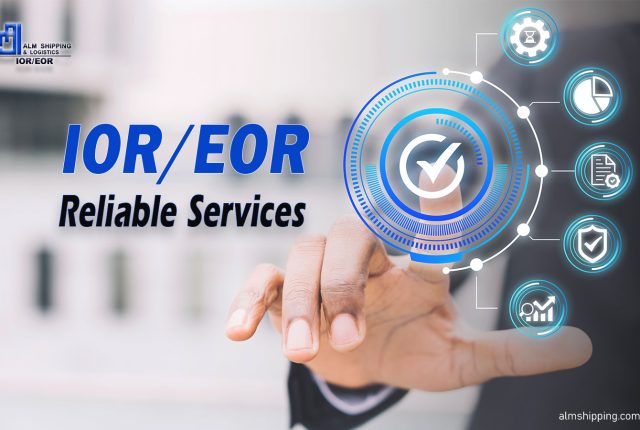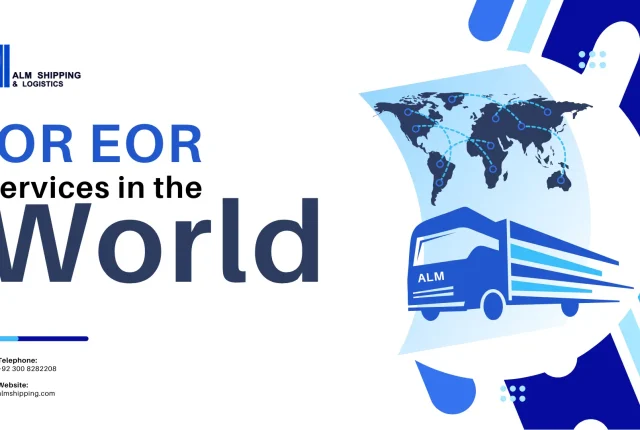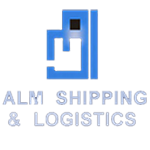
IOR vs Freight Forwarders: Key Differences to Chose The Best
IOR vs. Freight Forwarders: These roles are critical when a company is operating across borders, and can’t simply rely on the seller or buyer to assume the role due to regulation variations, risk, or logistics complexity.
What is an Importer of Record (IOR)?
An Importer of Record (IOR) is the entity legally responsible for importing goods into a country. That means:
-> Ensuring all customs regulations are met.
-> Paying import duties, taxes, fees.
-> Making sure the goods are classified correctly (HS codes), valued correctly, and documentation is accurate.
-> Being the legal name recorded with customs authorities as the “importer”.
In short: the IOR assumes legal and financial liability for the import process.
What is a Freight Forwarder?
A freight forwarder is a logistics professional or company that arranges the movement of goods from origin to destination. Their tasks typically include:
1. Booking cargo space (sea, air, land)
2. Consolidating shipments
3. Preparing and managing shipping documentation
4. Tracking and coordinating transport, sometimes customs paperwork
However, the freight forwarder does not usually assume the full legal responsibility for import compliance, duties, taxes and being the “importer” recorded with customs.
Put simply: they are the logistics “architect” of the transport, but not always the legally responsible importer.
Key Differences: IOR vs. Freight Forwarder

Here’s a quick comparison to clarify the difference:
| Feature | Importer of Record (IOR) | Freight Forwarder |
|---|---|---|
| Legal liability for import | Yes – pays duties, taxes; ensures compliance. | Generally no – arranges transport & documents, but doesn’t carry full liability. |
| Focus area | Compliance, customs, duties, legal side. | Logistics coordination: transport, routing, carriers. |
| Role in movement of goods | Can arrange or be part of the movement, but main is compliance. | Core role: moving goods, booking cargo, tracking. |
| Ownership or risk of goods | May take on risk since they are “importer” in record. | Typically acts as agent/intermediary; risk mostly lies with shipper or importer. |
| When you need them | When you don’t have a local entity, need compliance / regulatory coverage. | When you need transport logistics, shipping from origin to destination. |
| Can a freight forwarder also be IOR? | Yes, but only if they meet the legal requirements and take on liability. | They may plus if they offer IOR services, but many do not. |
Key takeaway: They can overlap, but they are not the same. Choosing one versus the other depends on the nature of your shipment, the country of import, regulatory complexity, and who you want responsible for compliance.
Why This Matters for Your Business
Risk & liability: If the IOR role is not properly handled, penalties, fines or delays can result.
Costs: Mis-classification or wrong duties can add unexpected cost. Having a proper IOR helps avoid surprise charges.
Efficiency: Using a freight forwarder helps with transport logistics; using a proper IOR simplifies import compliance – combining both gives smoother flow.
Global access: If you are importing into a country where you don’t have a local entity, engaging an IOR means you can still import legally.
Clarity of responsibilities: Knowing who is responsible for what part (logistics vs compliance) keeps things clean and avoids gaps.
How ALM Shipping and Logistics’ IOR Services Work
For companies working with ALM Shipping and Logistics, here’s how the IOR services apply:
Step 1: We become your Importer of Record
You assign ALM as your IOR for a given import into a jurisdiction where ALM can legally act. ALM assumes the legal & financial responsibility for that import.
Step 2: Compliance & Documentation
ALM handles HS-code classification, duty estimation, customs filings, import taxes – we ensure your shipment meets local regulatory requirements.
Step 3: Logistics coordination (often via freight forwarder)
While ALM handles IOR compliance, ALM or its network may also coordinate freight forwarding – route, carrier, tracking – but the key is their role in compliance.
Step 4: Transparent service plus cost control
With ALM as IOR, you get clarity on duties, taxes, your legal position. If you also use ALM’s forwarding / logistics services, you integrate logistics plus compliance.
Step 5: Benefiting you
-> No need to set up a local legal entity in the import country.
-> Reduced risk of compliance errors or penalties.
-> One-stop service (imports plus logistics) if desired.
-> Ideal for companies expanding globally who want to “plug in” an IOR and keep logistics smooth.
🔗 For more about ALM’s services you can visit their website: ALM Shipping and Logistics
Real-World Examples
A tech company based in Pakistan wants to import goods into the UAE but doesn’t have a UAE entity. They engage ALM to act as IOR – ALM handles the duties, customs compliance and becomes the import-legal entity. Meanwhile they use a freight forwarder to arrange shipping.
A manufacturer shipping sensitive goods (medical, electronics) into a strict regulatory country. They choose a provider who offers both freight forwarding and IOR services to cover both logistics and compliance (just as many providers promote this combo).
A small brand imports frequently into multiple markets. Instead of setting up local companies in each market, they use an IOR partner (like ALM) to simplify and scale across jurisdictions.
FAQ
Q1: Can a freight forwarder be the IOR?
In some cases yes, if they meet all legal/regulatory requirements to act as IOR and assume the liability. But this is not always the norm.
Q2: If I use a freight forwarder, do I still need an IOR?
Yes if your business has regulatory risks, is importing into jurisdictions where you don’t have a local entity and need formal legal importer representation. A freight forwarder handles logistics, but not always full compliance.
Q3: What kinds of goods need an IOR more than others?
Goods that face strict regulatory compliance (medical devices, telecom equipment, hazardous items), countries with complex import laws, or when the seller/buyer lacks local import entity.
Q4: What should I look for in an IOR service provider?
Clear legal liability: they assume the role of importer of record.
Experience with the import country’s regulations, duties, taxes.
Transparent cost structure.
Integration or compatibility with logistics/freight forwarding (so your supply chain is smooth).
Good reputation, track record.
Q5: Why should I use ALM’s IOR services rather than just a freight forwarder?
Because ALM offers the compliance/legal side (IOR) combined with logistics know-how. That means you do not just get “we will ship your goods” but “we will ensure your import is legally compliant”. This lowers your risk and simplifies your global trade operations.
Knowing the difference between an IOR and a freight forwarder is crucial. While freight forwarders arrange logistics, the IOR is legally accountable for compliance, duties and import regulations. For businesses expanding globally especially those without a local entity in the destination country engaging a capable IOR service provider like ALM Shipping and Logistics can be a smart move.
By combining ALM’s IOR services with your chosen logistics / freight forwarding pathways, you get the best of both worlds: compliant, smooth imports plus efficient cargo movement. If you’d like to explore how ALM can tailor IOR services for your business and target markets, I can draft a service-overview for you. Would you like that?






Leave a Reply